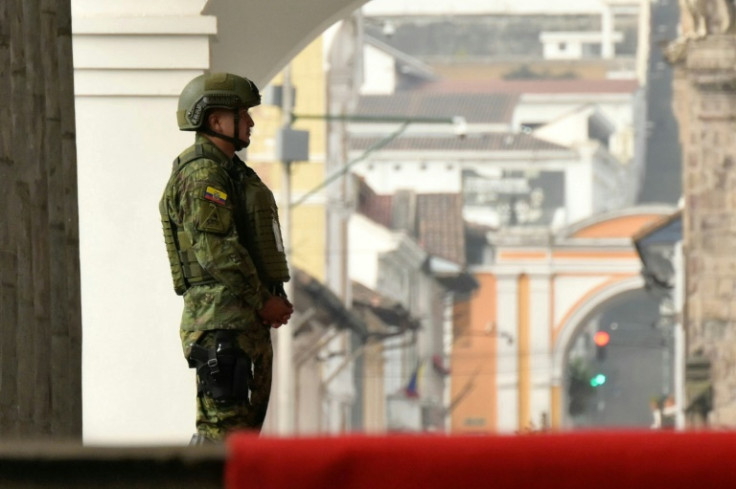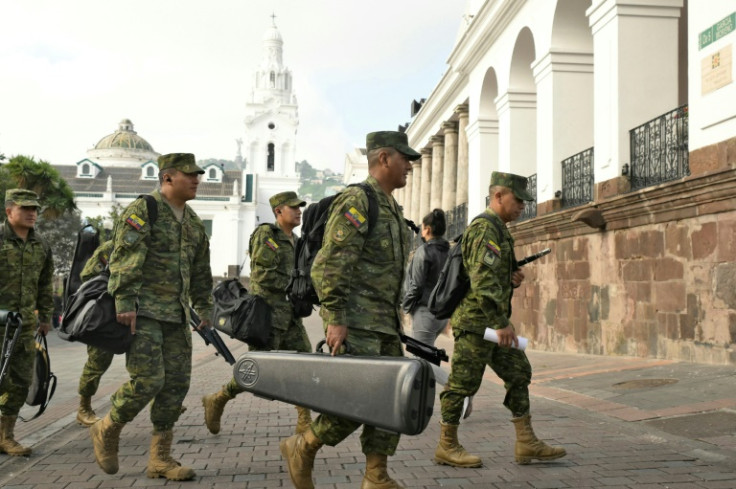Ecuador Gangsters Hold Police Hostage In Crisis For New President

Ecuador's new president grappled Tuesday with a security nightmare as gangsters held four police officers hostage after he declared a state of emergency in response to a drug kingpin's escape from prison.
President Daniel Noboa, who is only 36, was elected in October on a pledge to fight rampant drug-related crime and violence in this South American country that has a key intermediary role in the US- and European-bound cocaine trade.
Noboa declared a 60-day state of emergency throughout the country on Monday, including in Ecuador's notoriously violent prisons, and imposed a nighttime curfew.
He acted after a powerful gang leader, Jose Adolfo Macias, known as "Fito," escaped from prison.
Overnight Monday into Tuesday officials announced that four police officers had been kidnapped -- three in the coastal city of Machala and one in Quito.
Three people driving a vehicle without license plates abducted the officer in Quito, according to the police statement.
A chilling video circulating on social media illustrated the crisis that the president is now facing. It shows the group of three kidnapped officers sitting on the ground with a gun pointed at them, while one is forced to read a statement addressed to the president.
"You declared war, you will get war," this officer says. "You declared a state of emergency. We declare police, civilians and soldiers to be the spoils of war."
"Anyone found on the street after 11 pm will be executed," says the statement read by an audibly terrified police officer.
In a video posted on Instagram, Noboa said the state of emergency would allow armed forces to enter and help control prisons.
"We will not negotiate with terrorists nor rest until we return peace to all Ecuadorans," he said.
He announced last week that he will build two maximum security prisons -- similar to the one built by Salvadoran President Nayib Bukele during his war against gangs -- to hold the most dangerous criminals.
Macias had been serving a 34-year sentence for organized crime, drug trafficking and murder.
The 44-year-old leader of the powerful Los Choneros gang was declared missing Sunday by police conducting an inspection of the prison in the port city of Guayaquil.
He is believed to have been tipped off and escaped just hours before police arrived, according to presidential spokesman Roberto Izurieta.
The Attorney General's office filed charges against two prison officials it accuses of being involved in Macias' escape.
This is his second prison break -- the last was in 2013 when he was recaptured after three months.
After his escape, unrest broke out at penitentiaries in six of Ecuador's 24 provinces, according to Ecuador's prison authority SNAI, with guards taken hostage at some of the facilities.
Heavily armed police and soldiers entered the prisons of El Oro, Loja, Chimborazo, Cotopaxi, Azuay and Pichincha, after which the military distributed images of half-naked inmates rounded up in courtyards.
Long a peaceful haven sandwiched between top cocaine exporters Colombia and Peru, Ecuador has seen violence explode in recent years as enemy gangs with links to Mexican and Colombian cartels vie for control.
The kidnapping of police officers on Monday night came on top of explosions in the coastal town of Esmeraldas, in a region controlled by gangs.
Police say an explosive device was thrown near a police station and two vehicles were burned in other areas, with no one killed.
In Quito, a car was reportedly blown up, and a device exploded near a pedestrian bridge.
Drug violence has taken a heavy toll. The year 2023 closed with more than 7,800 homicides and 220 tons of drugs seized, a new record for the nation.
Since February 2021, clashes between prisoners have left more than 460 dead.

© Copyright AFP 2024. All rights reserved.







